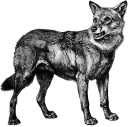Taxonomy - Classifying the Bobcat |
Kingdom - Animalia
 There are many different animals with many different forms, but from the ant to the elephant, all animals share certain traits. All animals are multicellular, they all get energy by eating food and most of them can move around. Scientists estimate that there are over a million species of animals in the world.
There are many different animals with many different forms, but from the ant to the elephant, all animals share certain traits. All animals are multicellular, they all get energy by eating food and most of them can move around. Scientists estimate that there are over a million species of animals in the world.
Phylum - Chordata
 Chordata are animals that are symmetrical. This means that their left side and their right side are alike. At some point in their lives, all chordata also had or have gill slits. (Yes, even humans! When humans are embryos they have gill slits, which eventually turn into lungs.) Chordata also have a skeleton of some type at some point in their lives. The chordates include mammals, birds, reptiles, amphibians, and fish. Some people think all chordates have backbones, but they don't. Lanclets are in the chordata phylum. They are small, fish-like marine animals without skeletons. Tunicates are also in the chordata phylum. Tunicates are small, tube-like filter-feeding marine animals without skeletons. Seasquirts are tunicates.
Chordata are animals that are symmetrical. This means that their left side and their right side are alike. At some point in their lives, all chordata also had or have gill slits. (Yes, even humans! When humans are embryos they have gill slits, which eventually turn into lungs.) Chordata also have a skeleton of some type at some point in their lives. The chordates include mammals, birds, reptiles, amphibians, and fish. Some people think all chordates have backbones, but they don't. Lanclets are in the chordata phylum. They are small, fish-like marine animals without skeletons. Tunicates are also in the chordata phylum. Tunicates are small, tube-like filter-feeding marine animals without skeletons. Seasquirts are tunicates.
Class - Mammalia
 Mammals are animals that have hair, three middle ear bones, and produce milk for their young.
Mammals are animals that have hair, three middle ear bones, and produce milk for their young.
Order - Carnivora
 Animals in the carnivore order usually eat meat, so they have strong jaws and sharp teeth. Most animals in this order eat meat, although some, like the raccoon, eat meat and plants and some don't eat meat at all. Animals in this order include
wolverines, bearded seals, American minks, fishers, long-tailed weasels, red wolves, black bears, and raccoons.
Animals in the carnivore order usually eat meat, so they have strong jaws and sharp teeth. Most animals in this order eat meat, although some, like the raccoon, eat meat and plants and some don't eat meat at all. Animals in this order include
wolverines, bearded seals, American minks, fishers, long-tailed weasels, red wolves, black bears, and raccoons.
Family - Felidae
 The felidae are the cats. They are meat eaters and hunters. Animals in this family include tigers, lions, cougars,
bobcats, Canada lynx, Florida panthers, jaguars, jaguarundis, margays, ocelots, leopards, cheetahs, and domestic cats.
The felidae are the cats. They are meat eaters and hunters. Animals in this family include tigers, lions, cougars,
bobcats, Canada lynx, Florida panthers, jaguars, jaguarundis, margays, ocelots, leopards, cheetahs, and domestic cats.
Genus - Lynx
 The lynx genus includes the bobcat and the lynx, animals that are very similar but not exactly the same.
The lynx genus includes the bobcat and the lynx, animals that are very similar but not exactly the same.
Species - Lynx rufus
 This is the bobcat. Its Latin name is Lynx rufus.
This is the bobcat. Its Latin name is Lynx rufus.
